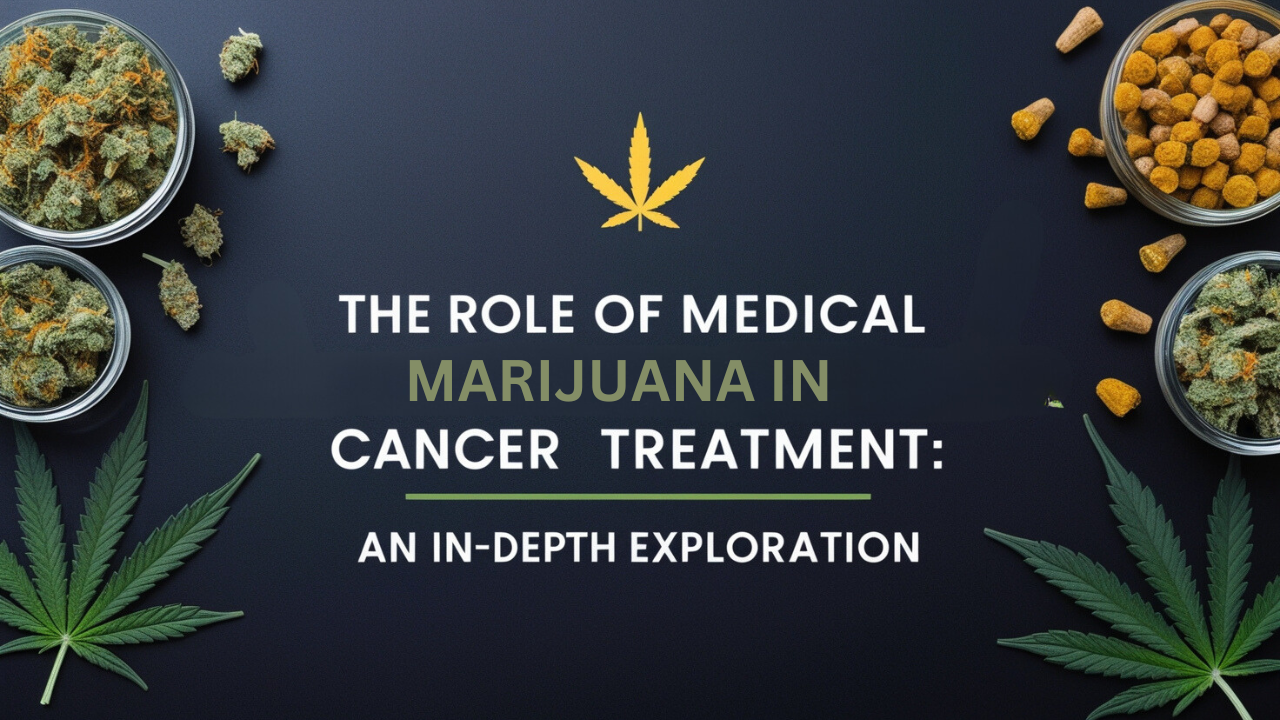Medical marijuana has arisen as a critical remedial instrument for malignant growth patients, giving help from probably the most difficult side effects related with the illness and its therapy. With the developing group of examination and expanding acknowledgment of pot in the medical local area, it’s fundamental to comprehend How medical marijuana can help in Cancer Treatment. This article gives a far reaching outline of the manners by which weed is utilized in disease treatment, its expected advantages, the logical reason for its belongings, and the dangers implied.
What is Medical Marijuana?
Medical marijuana alludes to the utilization of the pot plant and its concentrates to treat different medical circumstances. The pot plant contains many substance compounds, called cannabinoids, that connect with the body’s endocannabinoid framework to create various outcomes. The two most notable cannabinoids are:
- THC (Tetrahydrocannabinol): The essential psychoactive compound in marijuana, THC ties to cannabinoid receptors in the mind and focal sensory system, creating a scope of outcomes including elation, unwinding, and modified tangible discernment.
- CBD (Cannabidiol): Dissimilar to THC, CBD is non-psychoactive and has been displayed to have various remedial impacts, including mitigating, against nervousness, and hostile to seizure properties.
What’s more, there are numerous other cannabinoids, terpenes, and flavonoids found in weed that add to its helpful properties. When utilized medically, marijuana is regularly endorsed in controlled portions and plans to treat explicit circumstances or mitigate side effects.
How medical marijuana can help in Cancer Treatment
Cannabinoids, especially THC and CBD, connect with the body’s endocannabinoid framework, which assumes a vital part in controlling capabilities like temperament, hunger, torment, irritation, and safe reactions. This cooperation can assist malignant growth patients with overseeing side effects and aftereffects related with both the illness and its medicines.
- Torment The board
Disease patients frequently experience ongoing agony because of the actual cancer, medical procedure, radiation, chemotherapy, or nerve harm. Conventional torment meds, for example, narcotics, may not necessarily in all cases furnish adequate help or may accompany unwanted secondary effects, including sickness, dazedness, or the gamble of dependence.
Cannabinoids have been found to lessen torment through a few components:
- Pain relieving Impacts: THC ties to CB1 and CB2 receptors in the body, lessening torment discernment and advancing a feeling of prosperity.
- Mitigating Properties: CBD has been displayed to lessen irritation, which can add to relief from discomfort.
- Muscle Unwinding: Pot can assist with loosening up muscles and assuage the fits related with torment.
Research has shown that medical marijuana, especially in blend with customary agony prescriptions, can give more viable and manageable relief from discomfort for disease patients.
- Queasiness and Spewing Alleviation
Queasiness and spewing are normal results of chemotherapy, a therapy intended to kill or psychologist malignant growth cells. These side effects can be crippling and make it challenging for patients to keep up with satisfactory nourishment, which can additionally debilitate their body and influence their capacity to endure extra medicines.
Cannabinoids, particularly THC, have shown guarantee in lessening chemotherapy-actuated sickness and heaving. THC cooperates with cannabinoid receptors in the cerebrum, especially the CB1 receptor, which helps control sickness and spewing. Investigations have discovered that medical marijuana can be essentially as viable as or significantly more compelling than conventional enemy of queasiness drugs, for example, ondansetron or metoclopramide, with less secondary effects.
As a matter of fact, a review distributed in The Diary of Clinical Oncology found that pot based medicines were compelling in decreasing chemotherapy-prompted sickness and retching, with numerous patients revealing improved results contrasted with traditional enemy of queasiness prescriptions.
- Craving Feeling
Malignant growth treatment, especially chemotherapy, frequently prompts a huge diminishing in hunger. This condition, known as cachexia, can bring about weight reduction, muscle squandering, and debilitated invulnerable capability, making it harder for patients to recuperate from treatment.
Weed has for quite some time been known to animate craving, a peculiarity casually known as “the munchies.” THC, specifically, enacts the CB1 receptors in the cerebrum’s nerve center, which directs yearning and satiety. By advancing the arrival of ghrelin, a chemical that invigorates hunger, marijuana can assist patients with expanding their food consumption, keep a solid weight, and work on their generally speaking dietary status during disease treatment.
As a matter of fact, in a review directed by the Public Malignant growth Foundation, disease patients who utilized marijuana based items had further developed hunger and were better ready to keep up with weight during chemotherapy, at last working on their personal satisfaction.
- Lessening Aggravation
Irritation assumes a basic part in malignant growth movement. Growths frequently trigger a fiery reaction, which can help the disease cells multiply and spread to different pieces of the body. Aggravation can likewise prompt agony, enlarging, and organ brokenness, all of which add to the enduring of disease patients.
Cannabinoids, especially CBD, have strong mitigating properties. By associating with the CB2 receptors in the resistant framework, CBD can balance safe cell action, lessening the creation of favorable to fiery particles. Thus, weed might assist with easing back the movement of malignant growth and give side effect alleviation to patients experiencing aggravation related conditions.
Besides, preclinical examinations have shown that cannabinoids can hinder the development of specific malignant growth cells, albeit more exploration is expected to comprehend the components behind these impacts completely.
- Further developed Rest
Numerous disease patients battle with rest aggravations, frequently because of torment, tension, or the physical and profound cost of their ailment. Absence of rest can worsen weakness, stress, and different side effects, making it much more testing to adapt to malignant growth.
Cannabinoids, particularly THC, have been displayed to advance better rest by going about as a narcotic. THC can assist patients with nodding off quicker, stay unconscious longer, and experience more relaxing rest, which is vital for recuperation and in general prosperity.
Furthermore, CBD has been found to diminish tension, which can likewise further develop rest quality. For patients encountering sleep deprivation because of nervousness about their finding or treatment, CBD can be an important assistant treatment.
- Tension and Despondency Alleviation
A malignant growth conclusion frequently achieves huge close to home pain, including nervousness, sadness, and dread. These profound states can obstruct treatment, diminish the patient’s personal satisfaction, and even adversely influence the invulnerable framework.
Weed has shown guarantee as a successful therapy for tension and discouragement, the two of which are normal in disease patients. CBD, specifically, has been displayed to diminish nervousness by connecting with serotonin receptors in the mind, while THC can give temperament lifting impacts that help patients unwind and feel more quiet.
Truth be told, a review distributed in The Diary of Clinical Brain research found that disease patients who involved CBD revealed critical decreases in tension, while different examinations have found that marijuana use can work on in general state of mind and mental prosperity.
- Expected Anticancer Impacts
Past side effect help, there is developing interest in the capability of pot to affect malignant growth cells straightforwardly. A few research center and creature studies have recommended that cannabinoids may have antitumor properties, easing back the development of disease cells or in any event, prompting malignant growth cell passing. These impacts are remembered to result from cannabinoids’ capacity to obstruct disease cell flagging pathways, decrease cancer vein development (angiogenesis), and advance autophagy (the cycle by which cells stall and eliminate harmed parts).
While promising, these discoveries are still in the beginning phases, and considerably more exploration is expected to decide if cannabinoids can be utilized as a feasible malignant growth treatment. Nonetheless, a few examinations, for example, those distributed in Malignant growth Exploration and The English Diary of Disease, recommend that cannabinoids can possibly upgrade the viability of conventional disease treatments and work on generally speaking results for patients.
Dangers and Aftereffects
While medical marijuana can offer various advantages for malignant growth patients, taking into account the likely dangers and secondary effects is significant:
Mental Impedance: THC can cause transitory mental debilitation, including memory issues, disarray, and trouble concentrating. This can be especially unsettling for more seasoned patients or those with prior mental deterioration.
Mental Impacts: THC can prompt nervousness, neurosis, or mind flights in certain people, especially the individuals who are new to pot or have a past filled with psychological well-being conditions.
Drug Connections: Weed can cooperate with different prescriptions, including chemotherapy drugs, by influencing how they are processed in the liver. It is significant for disease patients to examine their weed use with their medical care supplier to stay away from potential medication collaborations.
Respiratory Issues: Partaking in marijuana can bother the lungs and fuel respiratory circumstances, in spite of the fact that non-smoking strategies (like vaporization or edibles) are frequently prescribed to limit these dangers.
Medical marijuana offers a multi-layered way to deal with disease care, tending to both the physical and inner difficulties looked by patients. From help with discomfort to further developing craving and reducing sickness, weed gives a variety of advantages that can assist malignant growth patients with exploring their therapy process with more prominent solace and personal satisfaction.
Nonetheless, it is fundamental to comprehend that medical marijuana isn’t a solution for malignant growth.
FAQ
How does medical marijuana help cancer patients?
Medical marijuana helps cancer patients by managing symptoms such as pain, nausea, loss of appetite, and inflammation. Cannabinoids like THC and CBD interact with the body's endocannabinoid system, offering relief from the side effects of cancer treatments like chemotherapy and improving overall quality of life.
What are the side effects of using medical marijuana for cancer treatment?
Some common side effects of medical marijuana include temporary mental impairment (memory problems, confusion), anxiety, nausea, and possible drug interactions with other medications. Smoking marijuana can also cause respiratory issues, but alternatives like vaporizing or consuming edibles may reduce this risk.
What is marijuana butter, and how is it used?
Marijuana butter, also known as "cannabutter," is a mixture of butter and decarboxylated cannabis. It's commonly used in edibles such as brownies, cookies, or cakes. The butter allows you to infuse the THC and other cannabinoids into food, providing a discreet and potent method of consuming marijuana.
How do you calculate the potency of marijuana butter?
he potency of marijuana butter depends on the strength of the cannabis used and the amount of butter you infuse it with. To estimate potency, calculate the total THC in the cannabis (based on its percentage), and divide it by the amount of butter used. This will give you an approximate THC dose per serving when used in recipes.
How can medical marijuana help manage symptoms of Alzheimer's disease?
Medical marijuana for Alzheimer's disease, particularly cannabinoids like THC and CBD, may help manage symptoms by reducing anxiety, agitation, and aggression, improving sleep, and potentially slowing cognitive decline. THC has calming effects, while CBD can alleviate inflammation and promote neuroprotection, supporting brain health and function in Alzheimer's patients.
How do I apply for a medical marijuana card in Jackson?
To apply for a medical marijuana card in Jackson, you must first schedule an appointment with a licensed healthcare provider who is authorized to recommend medical marijuana. After receiving the recommendation, you can submit your application online through the Mississippi State Department of Health's medical marijuana portal, providing necessary documents and paying the application fee.





